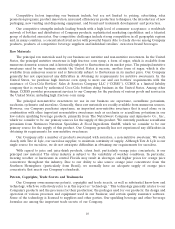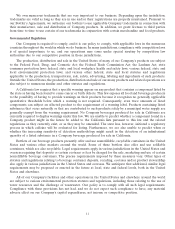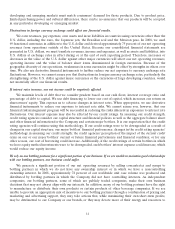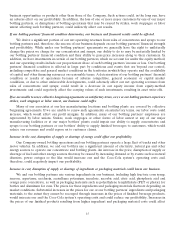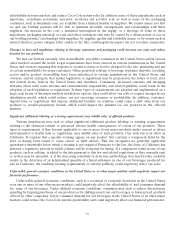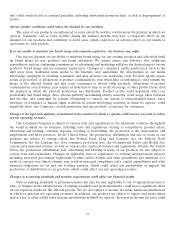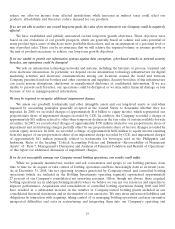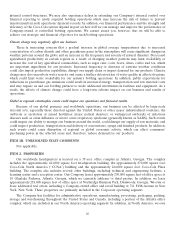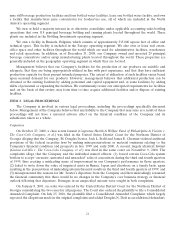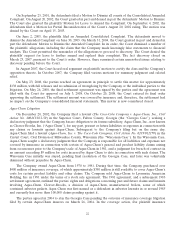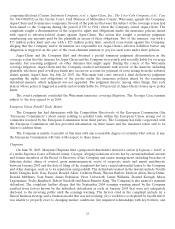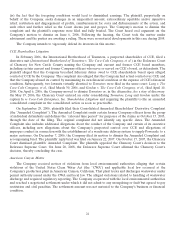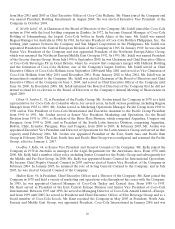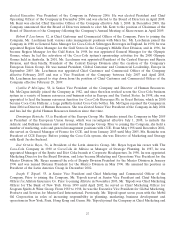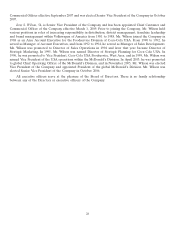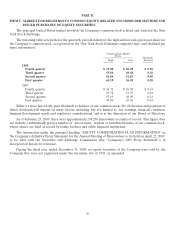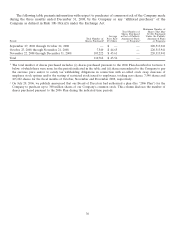Coca Cola 2008 Annual Report Download - page 22
Download and view the complete annual report
Please find page 22 of the 2008 Coca Cola annual report below. You can navigate through the pages in the report by either clicking on the pages listed below, or by using the keyword search tool below to find specific information within the annual report.internal control structures. We may also experience delays in extending our Company’s internal control over
financial reporting to newly acquired bottling operations which may increase the risk of failure to prevent
misstatements in such operations’ financial records. In addition, our financial performance and the strength and
efficiency of the Coca-Cola system depend in part on how well we can manage and improve the performance of
Company-owned or controlled bottling operations. We cannot assure you, however, that we will be able to
achieve our strategic and financial objectives for such bottling operations.
Climate change may negatively affect our business.
There is increasing concern that a gradual increase in global average temperatures due to increased
concentration of carbon dioxide and other greenhouse gases in the atmosphere will cause significant changes in
weather patterns around the globe and an increase in the frequency and severity of natural disasters. Decreased
agricultural productivity in certain regions as a result of changing weather patterns may limit availability or
increase the cost of key agricultural commodities, such as sugar cane, corn, beets, citrus, coffee and tea, which
are important ingredients for our products. Increased frequency or duration of extreme weather conditions
could also impair production capabilities, disrupt our supply chain or impact demand for our products. Climate
change may also exacerbate water scarcity and cause a further deterioration of water quality in affected regions,
which could limit water availability for our system’s bottling operations. In addition, public expectations for
reductions in greenhouse gas emissions could result in increased energy, transportation and raw material costs
and may require us and our bottling partners to make additional investments in facilities and equipment. As a
result, the effects of climate change could have a long-term adverse impact on our business and results of
operations.
Global or regional catastrophic events could impact our operations and financial results.
Because of our global presence and worldwide operations, our business can be affected by large-scale
terrorist acts, especially those directed against the United States or other major industrialized countries; the
outbreak or escalation of armed hostilities; major natural disasters; or widespread outbreaks of infectious
diseases such as avian influenza or severe acute respiratory syndrome (generally known as SARS). Such events
could impair our ability to manage our business around the world, could disrupt our supply of raw materials, and
could impact production, transportation and delivery of concentrates, syrups and finished products. In addition,
such events could cause disruption of regional or global economic activity, which can affect consumers’
purchasing power in the affected areas and, therefore, reduce demand for our products.
ITEM 1B. UNRESOLVED STAFF COMMENTS
Not applicable.
ITEM 2. PROPERTIES
Our worldwide headquarters is located on a 35-acre office complex in Atlanta, Georgia. The complex
includes the approximately 621,000 square foot headquarters building, the approximately 870,000 square foot
Coca-Cola North America (‘‘CCNA’’) building and the approximately 264,000 square foot Coca-Cola Plaza
building. The complex also includes several other buildings, including technical and engineering facilities, a
learning center and a reception center. Our Company leases approximately 250,000 square feet of office space at
10 Glenlake Parkway, Atlanta, Georgia, which we currently sublease to third parties. In addition, we lease
approximately 218,000 square feet of office space at Northridge Business Park, Dunwoody, Georgia. We own or
lease additional real estate, including a Company-owned office and retail building at 711 Fifth Avenue in New
York, New York. These properties are primarily included in the Corporate operating segment.
The Company has facilities for administrative operations, manufacturing, processing, packaging, packing,
storage and warehousing throughout the United States and Canada, including a portion of the Atlanta office
complex, which are included in our North America operating segment. In addition, in North America, we own
20


